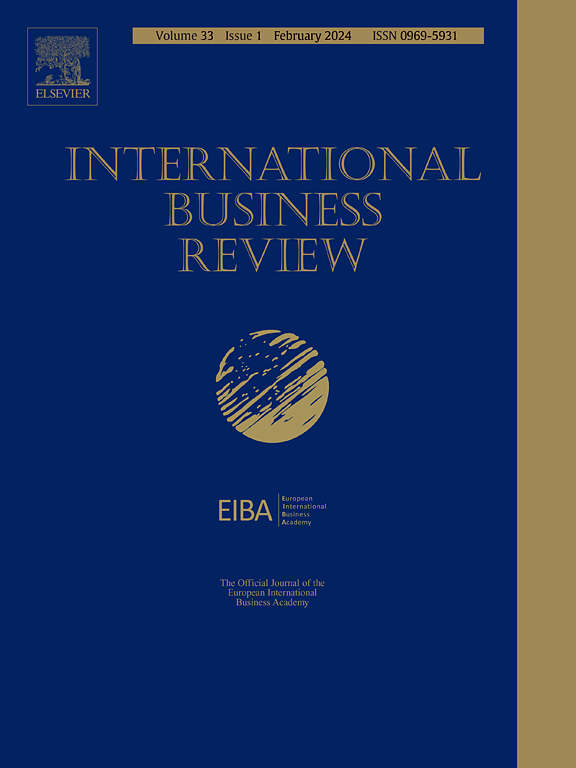Dodging expropriation? The role of cash holdings as a firm-level driver of risky FDI location choices
IF 6.1
1区 管理学
Q1 BUSINESS
引用次数: 0
Abstract
Despite the higher expropriation risks associated with investing in corrupt countries, many multinational enterprises (MNEs) still choose to do so. The motivations for investing in such countries remain unclear. Using rich data on 3500 outward foreign direct investment (FDI) projects undertaken by U.S. manufacturing MNEs, we find that cash-rich firms are significantly less likely to locate FDI activities in more corrupt countries. We show that this effect is most pronounced in firms with stronger governance and monitoring regimes. Overall, our findings, which are robust to a battery of tests and treatment of a potential endogenous determination of cash holdings and FDI location decisions, suggest that liquidity influences firms’ perceived expropriation risk, with cash-rich firms optimally sheltering their FDI activities from more corrupt countries when expected expropriation costs outweigh the economic gains that can be easily exploited through FDI. These findings have important implications for research, practice, and policy regarding the FDI location decisions of MNEs.
避开征用?现金持有量在企业层面驱动外商直接投资风险区位选择的作用
尽管在腐败国家投资存在较高的被征收风险,但许多跨国企业(MNEs)仍然选择这样做。在这些国家投资的动机尚不清楚。利用美国制造业跨国公司开展的3500个对外直接投资(FDI)项目的丰富数据,我们发现现金充裕的公司在更腐败的国家开展FDI活动的可能性显著降低。我们表明,这种效应在治理和监督机制更强的公司中最为明显。总体而言,我们的研究结果对现金持有量和FDI选址决策的潜在内生决定进行了一系列测试和处理,结果表明流动性影响企业感知到的征用风险,当预期的征用成本超过可以通过FDI轻松利用的经济收益时,现金充裕的企业最优地保护其FDI活动不受更腐败国家的影响。这些发现对跨国公司FDI选址决策的研究、实践和政策具有重要意义。
本文章由计算机程序翻译,如有差异,请以英文原文为准。
求助全文
约1分钟内获得全文
求助全文
来源期刊

International Business Review
BUSINESS-
CiteScore
14.10
自引率
6.90%
发文量
95
审稿时长
62 days
期刊介绍:
The International Business Review (IBR) stands as a premier international journal within the realm of international business and proudly serves as the official publication of the European International Business Academy (EIBA). This esteemed journal publishes original and insightful papers addressing the theory and practice of international business, encompassing a broad spectrum of topics such as firms' internationalization strategies, cross-border management of operations, and comparative studies of business environments across different countries. In essence, IBR is dedicated to disseminating research that informs the international operations of firms, whether they are SMEs or large MNEs, and guides the actions of policymakers in both home and host countries. The journal warmly welcomes conceptual papers, empirical studies, and review articles, fostering contributions from various disciplines including strategy, finance, management, marketing, economics, HRM, and organizational studies. IBR embraces methodological diversity, with equal openness to papers utilizing quantitative, qualitative, or mixed-method approaches.
 求助内容:
求助内容: 应助结果提醒方式:
应助结果提醒方式:


